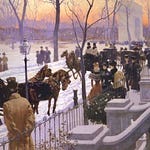Excerpts from Common Sense
By Thomas Paine
Hello and welcome to Classically Speaking. I’m your host, Curt Simmons, and today we're going to take another break from classic short stories and instead, because it’s so timely and relevant and so very important in our lives today, we’re going to listen to a few excerpts from Chapters 1 and 2 of Common Sense by Thomas Paine.
As Americans continue to ask, at this point in history, “Is this who we are?” Common Sense can only answer that this is who we were. Then.
Published in 1776, Common Sense was a major influence on the evolution of the American desire for a fair and humane government and a free and open society, not to mention the voice and the content of the Declaration of Independence. Built on the themes of equality for all humanity, and the rejection of slavery, tyranny, autocracy, and all absolute governments, divine right, hereditary rule, Common Sense, particularly the first two chapters, engages us at a remarkably personal and human level as it describes the fundamentals and the roles of society and government in our lives. It defined the American mindset for freedom and self-determination, and it set the urgent tone for the American Revolution. That urgency has returned. Because whether it be the struggle to obtain freedom and independence, or the struggle to keep it, the stakes are always the same— to be ruled, to be enslaved, to be property— Or to be free to live life your own way.
Until the battles of Lexington and Concord in April of 1775, Colonial Americans grappled with the financial burden, imposed by the British Parliament, in the Stamp Act of 1765. And while the colonists resisted— most were still strongly attached to Great Britain and reconciliation.
In 1772, Thomas Paine was fired from his job in England after publishing a piece supporting the reform of his position as an excise officer. He separated from his wife, sold his property, and sailed to America. Arriving in 1774, and with the help of a letter of introduction from Benjamin Franklin, Paine found work as a journalist in Philadelphia.
In 1775, he published African Slavery in America, attacking international slave trade, including the colonies, as a violation of Christian principles answerable to “the final judge.“
In his 47-page pamphlet entitled Common Sense, Thomas Paine reframed the problem the colonists were having with the actions of Parliament— as the problem with the nature of monarchy and the divine right of kings. The king reigned. The people obeyed.
The popularity of Common Sense was instantaneous and enormous. Published in January, 1776, it reportedly sold an estimated 100,000 to 150,000 copies in its first year. It was loaned, borrowed, and read aloud for the illiterate. —Within six months of publishing, Colonial public opinion was transformed from reconciliation— into the Declaration of Independence. “Simple facts, plain arguments, and common sense,” ignited a revolution in the minds of the people.
Who we are now, as Americans, and as a nation, remains to be seen.
Common Sense
by Thomas Paine
CHAPTER I (Excerpts)
OF THE ORIGIN AND DESIGN OF GOVERNMENT IN GENERAL, WITH CONCISE REMARKS ON THE ENGLISH CONSTITUTION.
Some writers have so confounded society with government, as to leave little or no distinction between them; whereas they are not only different, but have different origins. Society is produced by our wants, and government by our wickedness; the former promotes our positively by uniting our affections, the latter our negatively by restraining our vices. The one encourages intercourse, the other creates distinctions. The first a patron, the last a punisher.
Society in every state is a blessing, but government even in its best state is but a necessary evil; in its worst state an intolerable one; for when we suffer, or are exposed to the same miseries by a government, which we might expect in a country without government, our calamity is heightened by reflecting that we furnish the means by which we suffer. Government, like dress, is the badge of lost innocence; the palaces of Kings are built on the ruins of the bowers of paradise. For were the impulses of conscience clear, uniform, and irresistibly obeyed, man would need no other lawgiver; but that not being the case, he finds it necessary to surrender up a part of his property to furnish means for the protection of the rest; and this he is induced to do by the same prudence which in every other case advises him out of two evils to choose the least. Wherefore, security being the true design and end of government, it unanswerably follows, that whatever form thereof appears most likely to ensure it to us, with the least expense and greatest benefit, is preferable to all others.
In order to gain a clear and just idea of the design and end of government, let us suppose a small number of persons settled in some sequestered part of the earth, unconnected with the rest, they will then represent the first peopling of any country, or of the world. In this state of natural liberty, society will be their first thought. —A thousand motives will excite them thereto, the strength of one man is so unequal to his wants, and his mind so unfitted for perpetual solitude, that he is soon obliged to seek assistance and relief of another, who in his turn requires the same. Four or five united would be able to raise a tolerable dwelling in the midst of a wilderness, but— one man— might labour out of the common period of life without accomplishing any thing; when he had felled his timber he could not remove it, nor erect it after it was removed; hunger in the mean time would urge him from his work, and every different want call him a different way. Disease, nay even misfortune would be death, for though neither might be mortal, yet either would disable him from living, and reduce him to a state in which he might rather be said to perish than to die.
Thus necessity, like a gravitating power, would soon form our newly arrived emigrants into society, the reciprocal blessings of which, would supersede, and render the obligations of law and government unnecessary while they remained perfectly just to each other; but as nothing but heaven is impregnable to vice, it will unavoidably happen, that in proportion as they surmount the first difficulties of emigration, which bound them together in a common cause, they will begin to relax in their duty and attachment to each other; and this remissness will point out the necessity of establishing some form of government to supply the defect of moral virtue.
Some convenient tree will afford them a State-House, under the branches of which, the whole colony may assemble to deliberate on public matters. It is more than probable that their first laws will have the title only of Regulations, and be enforced by no other penalty than public disesteem. In this first parliament every man, by natural right, will have a seat.
But as the colony increases, the public concerns will increase likewise, and the distance at which the members may be separated, will render it too inconvenient for all of them to meet on every occasion as at first, when their number was small, their habitations near, and the public concerns few and trifling. This will point out the convenience of their consenting to leave the legislative part to be managed by a select number chosen from the whole body, who are supposed to have the same concerns at stake as those who appointed them, and who will act in the same manner as the whole body would act, were they present. If the colony continues increasing, it will become necessary to augment the number of the representatives, and that the interest of every part of the colony may be attended to, it will be found best to divide the whole into convenient parts, each part sending its proper number; and that the elected might never form to themselves an interest separate from the electors, prudence will point out the propriety of having elections often; because as the elected might by that means return and mix again with the general body of the electors in a few months, their fidelity to the public will be secured by the prudent reflection of not making a rod for themselves. And as this frequent interchange will establish a common interest with every part of the community, they will mutually and naturally support each other, and on this (not on the unmeaning name of King) depends the strength of government, and the happiness of the governed.
Here then is the origin and rise of government; namely, a mode rendered necessary by the inability of moral virtue to govern the world; here too is the design and end of government, viz. freedom and security. And however our eyes may be dazzled with show, or our ears deceived by sound; however prejudice may warp our wills, or interest darken our understanding, the simple voice of nature and of reason will say, it is right.
I draw my idea of the form of government from a principle in nature, which no art can overturn, viz. that the more simple any thing is, the less liable it is to be disordered; and the easier repaired when disordered; and with this maxim in view, I offer a few remarks on the so much boasted constitution of England. That it was noble for the dark and slavish times in which it was erected, is granted. When the world was overrun with tyranny the least remove therefrom was a glorious rescue. But that it is imperfect, subject to convulsions, and incapable of producing what it seems to promise, is easily demonstrated.
Absolute governments (though the disgrace of human nature) have this advantage with them, that they are simple; if the people suffer, they know the head from which their suffering springs, know likewise the remedy, and are not bewildered by a variety of causes and cures. But the constitution of England is so exceedingly complex, that the nation may suffer for years together without being able to discover in which part the fault lies; some will say in one and some in another, and every political physician will advise a different medicine.
CHAPTER 2 (Excerpts)
OF MONARCHY AND HEREDITARY SUCCESSION.
Mankind being originally equals in the order of creation, the equality could only be destroyed by some subsequent circumstance; —the distinctions of rich, and poor, may in a great measure be accounted for, and that without having recourse to the harsh, ill-sounding names of oppression and avarice. Oppression is often the consequence, but seldom or never the means of riches; and though avarice will preserve a man from being necessitously poor, it generally makes him too timorous to be wealthy.
But there is another and greater distinction, for which no truly natural or religious reason can be assigned, and that is, the distinction of men into Kings and subjects. Male and female are the distinctions of nature, good and bad the distinctions of heaven; but how a race of men came into the world so exalted above the rest, and distinguished like some new species, is worth inquiring into, and whether they are the means of happiness or of misery to mankind.
Men who look upon themselves born to reign, and others to obey, soon grow insolent; selected from the rest of mankind their minds are early poisoned by importance; and the world they act in differs so materially from the world at large, that they have but little opportunity of knowing its true interests, and when they succeed to the government are frequently the most ignorant and unfit of any throughout the dominions.
In short, monarchy and succession have laid, not this or that Kingdom only— but the world in blood and ashes. 'Tis a form of government which the word of God bears testimony against, and blood will attend it.
In England a King hath little more to do than to make war and give away places; which in plain terms, is to impoverish the nation and set it together by the ears. A pretty business indeed for a man to be allowed eight hundred thousand sterling a year for— and worshiped into the bargain! Of more worth is one honest man to society and in the sight of God, than all the crowned ruffians that ever lived.
For as in absolute governments the King is law, so in free countries the law ought to be King; and there ought to be no other.
Common sense will tell us, that the power which hath endeavored to subdue us, is of all others the most improper to defend us. Conquest may be effected under the pretense of friendship; and ourselves after a long and brave resistance, be at last cheated into slavery.
The more men have to lose, the less willing are they to venture. The rich are in general slaves to fear, and submit to courtly power with the trembling duplicity of a Spaniel.
When William the Conqueror subdued England, he gave them law at the point of the sword; and until we consent, that the seat of government, in America, be legally and authoritatively occupied, we shall be in danger of having it filled by some fortunate ruffian, who may treat us in the same manner, and then, where will be our freedom? where our property?
As to religion, I hold it to be the indispensable duty of all government, to protect all conscientious professors thereof, and I know of no other business which government hath to do therewith. Let a man throw aside that narrowness of soul, that selfishness of principle, which the miserly of all professions are so unwilling to part with, and he will be delivered of his fears on that head. Suspicion is the companion of mean souls, and the bane of all good society. For myself, I fully and conscientiously believe, that it is the will of the Almighty, that there should be diversity of religious opinions among us: It affords a wider field for our Christian kindness. Were we all of one way of thinking, our religious dispositions would want matter for probation; and on this liberal principle, I look on the various denominations among us, to be like children of the same family, differing only, in what is called, their Christian names.
I can’t help but wonder what Thomas Paine would say today? His position on the equality of mankind suggests that he would support those enslaved and their struggle for freedom. What would he have said about mass deportations? The separation of children from their parents at the border. Government managed pregnancies? Banning books? What would he have to say about the disenfranchisement of those with nonconforming gender identities? Would he say that immunity is a dividing line between a President and a King?
Thank you again for listening to Classically Speaking, still a free publication— All my content is free— there is no pay wall. So, if you’d like to subscribe, you’ll receive email notifications of upcoming episodes as they’re published. I also appreciate any comments, likes, notes, sharing, restacking. Thanks again, everybody. May you be safe and happy.














Share this post